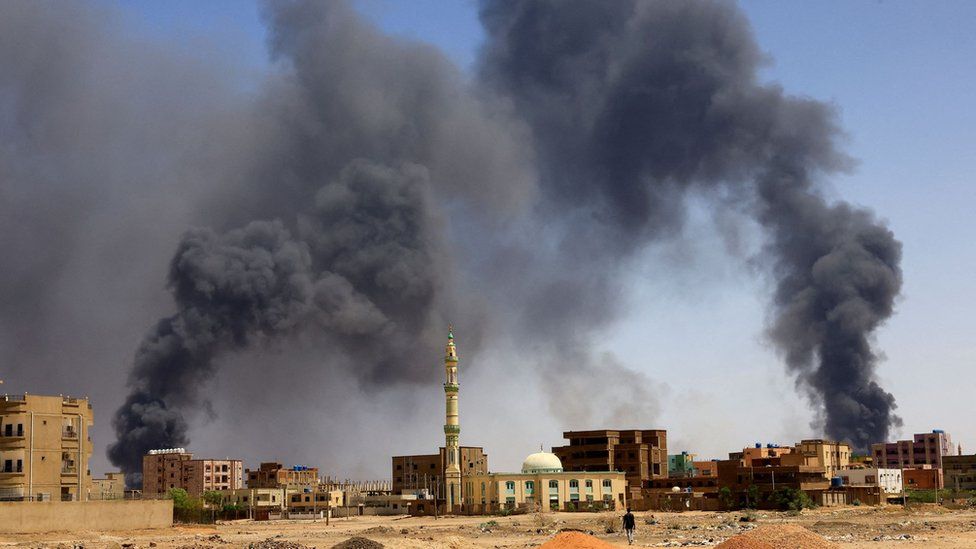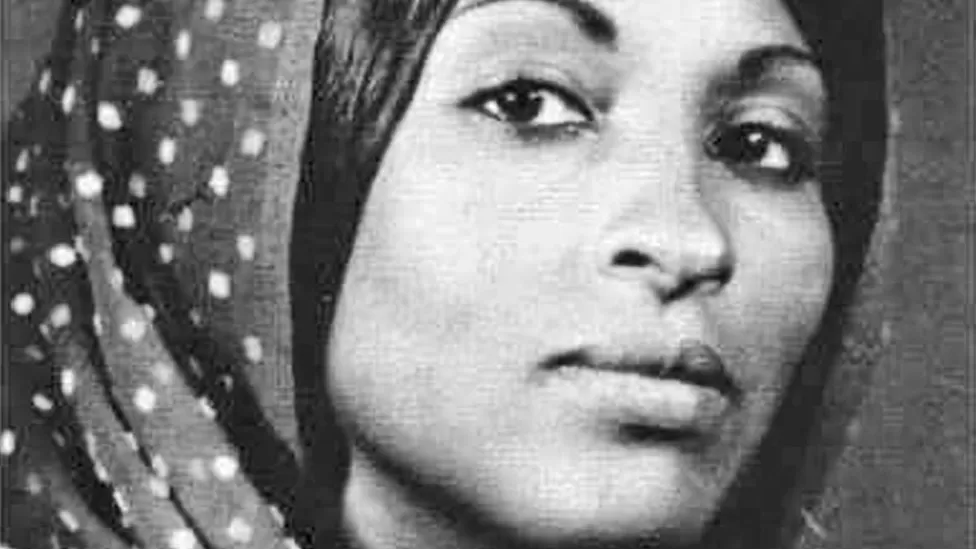The death of a well-known actress, killed in cross-fire in the north of Khartoum, has shocked residents of Sudan’s capital. But she is just one of many civilians still in the city who are paying with their lives as the fighting continues to rage despite the latest ceasefire.
Zeinab Mohammed Salih is a journalist living in Omdurman, next to the Sudanese capital – she describes daily life for people caught up in the conflict.
Asia Abdelmajid, who turned 80 last year, was famous for her theatre performances – first coming to prominence in the 1965 production of the play Pamseeka.
It was put on at the national theatre in Omdurman to mark the anniversary of Sudan’s first revolution against a coup leader. She was considered a pioneer of the stage – and the country’s first professional stage actress, later retiring to become a teacher.
Her family say she was buried within hours of her shooting on Wednesday morning in the grounds of a kindergarten where she had been most recently working. It was too dangerous to take her to a cemetery.
It is not clear who fired the shot that killed her in the clashes in the northern suburb of Bahri. But paramilitary fighters of the Rapid Support Forces (RSF), who are ensconced in their bases in residential areas across the city, continue to battle the army, which tends to attack from the air.
The RSF says the military tried to deploy members of the police’s special force unit on Wednesday – but the group alleges it rebuffed their ground offensive.
UN chief Antonio Guterres has called on the warring factions to stop the fighting immediately, before the conflict escalates into an all-out war.
With a military jet flying overhead as I write and WhatsApp messages arriving with more bad news of my friends caught up in the fighting, it feels like neither side is serious about ending their deadly confrontation.
“I was sitting with my brother in the sitting room when we heard the loud noise of the shell and the dust coming from the kitchen – we thought the whole wall had just collapsed,” my friend Mohamed el-Fatih, a fellow journalist, told me.
His apartment in Burri, east of the army’s headquarters in central Khartoum, was bombed on Monday night.
“My neighbours upstairs and downstairs were terrified and screaming, we had to evacuate immediately to another area.”
His suburb is completely occupied by the RSF and rockets are often fired from the military headquarters where it is believed Abdel Fattah al-Burhan, the army chief, and his aides are staying.
My friend Hiba el-Rayeh has also just been in contact in great distress after her mother Sohair Abdallah el-Basher, a respected lawyer, and two uncles were killed last Thursday in a shell that came from a bridge over the River Nile directed towards the Presidential Palace. They were living close by.
Her uncles had actually come to help them escape during one of last week’s so-called humanitarian ceasefires.

In another suburb called Khartoum 2, to the west of the military headquarters, estate agent Omer Belal has decided to stay and guard his home.
The 46-year-old has sent his family to a safer district while he and a few other men in the neighbourhood seek to protect their properties from the looting and armed robbery that is occurring across the city.
People’s houses, banks, factories, supermarkets and clothing shops are all being ransacked.
Another friend, who asked not to be named, spent five days in a restaurant in Khartoum 2 when the battles first broke out on 15 April.
He managed to escape during the first shaky ceasefire. First he went to the north of the city then decided to go overland to Ethiopia, a trip that took five days.
Now in Addis Ababa, Ethiopia’s capital, he messaged to say he had seen piles of bodies as he left Khartoum 2.
Basil Omer, a medic and volunteer, described fleeing his flat when it was shelled in al-Manshiya, east of the army headquarters.
“We spent three days only sleeping on the ground. In the end it was impossible to stay there, I sent my children and their mother to el-Gezira state with my in-laws and I went to stay with my parents in Khartoum North,” he said.
I live in Omdurman, regarded as one of the safest places in town – though bullets are constantly flying through people’s windows.
A couple of days ago my neighbour was hit by a bullet in her leg while she slept following an airstrike, which have been happening about two times every hour. Although there were fewer strikes on Wednesday.
The Sudanese factions have agreed to a new seven-day truce starting on Thursday, but given that they are currently meant to be observing a humanitarian ceasefire and previous ones have broken down – none of us are holding our breath.
Each day we grow more despondent. Most residents of Khartoum feel abandoned and at a loss that the international community seems unable to exert their influence to bring the generals to heel, given they managed to get them to agree to share power with civilians in 2019 after long-time leader Omar al-Bashir was ousted.
